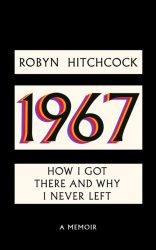 1967 opens with Robyn Hitchock, aged 12, entering the English public school system, leaving the family home behind along with his model trams and trolleybuses. His has been a relatively privileged life so far, insulated, as he says here, from the way the majority of British children grow up. Privately educated at preparatory schools, he has passed the exams (including Classical Greek) required for entry to Winchester College and this entertaining memoir details his first two years there, his recollection of the monochromatic routine of life in a boarding school are contrasted by his burgeoning awareness of the Technicolor explosions in pop music of 1966-1967.
1967 opens with Robyn Hitchock, aged 12, entering the English public school system, leaving the family home behind along with his model trams and trolleybuses. His has been a relatively privileged life so far, insulated, as he says here, from the way the majority of British children grow up. Privately educated at preparatory schools, he has passed the exams (including Classical Greek) required for entry to Winchester College and this entertaining memoir details his first two years there, his recollection of the monochromatic routine of life in a boarding school are contrasted by his burgeoning awareness of the Technicolor explosions in pop music of 1966-1967.
Amidst Hitchcock’s tales of Wykehamist (as pupils of the college are called) rituals and archaic rules, he details his listening progress via records played on his dormitory’s “house gramophone.” The Beatles’ “Rubber Soul” is playing when he is first introduced to his dorm mates, but it is his discovery of Dylan’s ‘Like A Rolling Stone’ which fully resonates with him, “The song seems to be addressing me personally, marooned in this nest of aliens,” and on hearing the album “Highway 61 Revisited” he is transfixed, especially fascinated with the eleven minutes and eighteen seconds of ‘Desolation Row’. At his school Hitchcock determines two distinct groupings among the pupils, “the meatheads and the groovers,” he is destined to be one of the latter as he discovers Hendrix, Pink Floyd, The Incredible String Band and others. He buys the String Band’s “The 5000 Spirits Or The Layers Of The Onion” album on the strength of its cover and adds Mike Heron and Robin Williamson to his list of people who probably know the meaning of life (Dylan tops the list). He even attends a “happening” where the music is provided by a Winchester art school student, a certain Brian Eno.
Aside from the memorable cast of characters (fellow pupils, emotionally stunted teachers and the porter, Mr. Trotter, whose job it is to wake the youngest pupil in each house who then has to awaken his dorm mates) who populate the school Hitchcock shares several memories of his family. His father, wounded in the Second World War, is distant, managing his trauma via painting, his mother valiantly tries to rein in his father’s slight eccentricities while his grandmother is lovingly recalled. Hitchcock’s fascination with crustaceans is perhaps explained by his recall of collecting crayfish from the stream which runs under his family’s house.
Hitchcock skilfully brings to life the turning point, for the younger generation at least, which was 1967 as post war Britain with its slightly curled egg and cress sandwiches took flight on psychedelic wings. Like a hipper version of Anthony Buckeridge’s schoolboy hero, Jennings, he adroitly describes the faintly homoerotic undertones of boarding school life while his accounts of the records and musicians he discovers vividly capture the excitement and adventure of the music of the time. That he does so in his unique style, droll and with the occasional whiff of whimsy and surrealism, familiar to anyone who has seen him live, is the icing on the cake. One can easily picture him telling any of these tales in between songs on stage.
In his epilogue Hitchcock writes that, for him, “1967 finished but it never ended.” He sees the release of Dylan’s “John Wesley Harding” early the next year as signalling “the great retreat” as psychedelia fell from flavour. There’s a brief mention of The Soft Boys, an opportunity for him to live his teenage dream as he closes the book saying that all through his career he has carried the soul of 1967, a year, he says, that gave him a job for life. It’s a delightful read.



Ah, Jennings. The most brilliant schoolboy stories ever. Currently reading “According to Jennings” after a 70 year gap. Enjoyed RH in Chester last year too, so I look forward to finding the book.